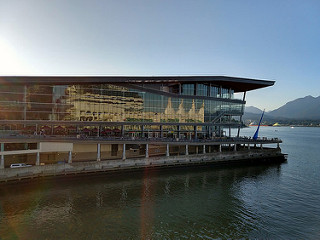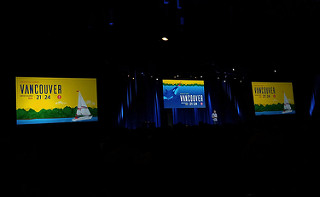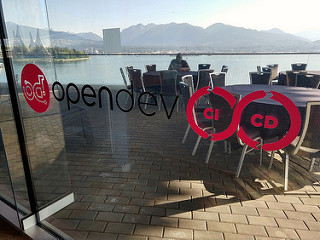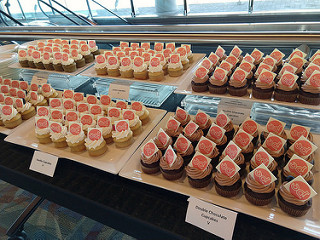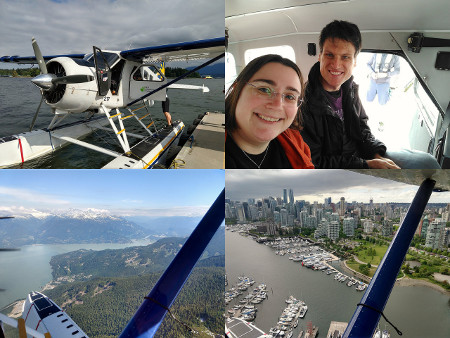Back in May I traveled to Vancouver for the second time in my life. The first was in 2015 when I was there for an OpenStack Summit, and the summit brought me back this time, as I was on the program committee and giving a keynote at OpenDevCon, co-located with the summit. It’s probably my favorite venue in the world, hugging the harbor to provide spectacular views and the opportunity for nice walks along the waterfront during breaks.
The last time I was at an OpenStack Summit was in Barcelona 18 months prior, during my last week with HPE. As a high end to much of my OpenStack work, I spent that week prepping for and then delivering one of the keynotes where I demonstrated live addition of OpenStack-powered clouds to to the production Nodepool in the OpenStack project CI system. At the time, the key messaging was OpenStack as an “integration engine” that empowers organizations to embrace a wide breadth of proven technologies, from storage to compute-focused virtualization to software-defined networking. I think in these 18 months we’ve started taking those features for granted as the virtualized server side of the market becomes more commoditized and what really resonates with companies today is a desire to avoid vendor lock-in. With this change of pace, the OpenStack Summit this time around had strong messaging around “Open Infrastructure” so you’re not bound to a single cloud provider. Key to the product strategy in the container space, it’s messaging that I’m familiar with and generally resonates with my own goals in the free software movement.
As far as the OpenStack Summit itself goes, for the first time I wasn’t there to collaborate with my peers on OpenStack, so it was a very different experience than past years. As an industry observer this time, I could enjoy the keynote explorations into edge computing and the improvements in hardware involvement in virtualization, from CPUs to networks. There was the general collaboration between would-be competitors throughout the keynotes was what I’d come to expect from this amazing community (with the notable exception of Canonical…). In addition to their general “open infrastructure” messaging, there also has started to be a shift in the role of the foundation, with support of additional projects that, while complementary, aren’t strictly tied to OpenStack itself. This was highlighted with announcements around the independent projects Kata Containers and Zuul CI. Amusingly, containers and CI systems are both things that are now solidly in my wheelhouse, so it appears my own career trajectory is currently mirroring what we’re seeing there. The OpenDev conference I was there for solidly showed their commitment to CI/CD systems, but massive container tracks at the event make me now see the value in Mesosphere being a stronger part of the conversation at future summits.
OpenDev was great. I wrote about my keynote and the event in broad swaths over on the company blog in Open CI/CD Systems Gaining Traction. My keynote was about doing CI/CD for microservices in containers, where the bulk of the 14 minute talk was a demo where I showed deploying Jenkins, Github and a brand new Git repository for a website, with tests, on DC/OS in 12 minutes. It was a nerve-wracking adventure up there on the stage, but it succeeded! If you’re curious, the demo is fully open source so you can even try it yourself: video, slides and demo.
I also enjoyed finally meeting Benjamin Mako Hill (who I overlapped with a bit in Ubuntu work very early on) and seeing him speak on a topic he has written about, Free Software Needs Free Tools (video). He walked through the lessons Linux learned from their trouble with the proprietary BitKeeper software and stressed the importance of using free tools for the development of free software. It was an incredibly popular talk and message for this crowd, as much of the work we’re all doing is focused on an open source ecosystem for software development. A talk from Fatih Degirmenci and Daniel Farrell on Continuous Delivery Across Communities was also fascinating (video). Collaborating at OpenCI.io there are multiple open source projects that now do some degree of hooking their CI systems together to test specific changes against each other, it was fun to sit down with them on day two of the conference to see what the next steps are for making software development better across open source by using forward-thinking strategies that cross the boundaries between communities.
The conference had several talks spanning the open source CI/CD ecosystem today, from Spinnaker to Zuul to a Kubernetes-driven implementation of CI/CD tooling. What was most valuable to me though were the collaboration sessions, which get several practitioners in a room together, many of whom had never met, to talk through common problems and start coming up with solutions and action items. I can catch up with the talks online post-event, but it was energizing to be in a room with others who share my interest in these topics and to tackle popular operations and culture topics outside of the general DevOps umbrella, where I’m more accustom to seeing these discussions happen.
I was really happy with how this event turned out, and it was a pleasure to be invited on the program committee for it. The OpenStack Foundation succeeded in pulling of a flawless event that pulled in a lot of the right people far beyond the crowd who’d normally come to anything OpenStack related. It was really nice to see that several people had come in just for this event itself, and that made it so important voices some of us hadn’t heard before were able to add an amount of diversity to the conversations. Plus, there were cupcakes.
More photos from the OpenStack Summit and OpenDev here: https://www.flickr.com/photos/pleia2/albums/72157691445454010
On Thursday OpenDev was behind me, and I spent the afternoon in a few final sessions at the summit itself and catching up with people before taking the train to the airport. But the morning was reserved for something a lot more fun than a conference, I had booked a seaplane tour! When I visited Vancouver last time I watched longingly as the seaplanes took off and landed all week, but I decided to go to amazing Vancouver Aquarium instead on my free day. I wouldn’t miss the seaplanes this time! So I Thursday morning I dragged (ok, it didn’t take much convincing) my friend Steve along with me down to the port, which was conveniently right next to the conference venue.
We did the “Extended Panorama” (Adventure Tour) from Harbour Air, where our charming and amusing pilot took us up for about 45 minutes through the nearby mountains for much of it. The tour kicked off with a reminder from the pilot that seaplanes don’t have brakes (the water does that) and limited steering ability. Hah! Once airborne, we flew around the harbor and then into the snow-capped mountains. The tour offered gorgeous glimpses of mountain lakes and other large waterways and concluded by flying over the city of Vancouver before splashing back down into the harbor. At $200/person it’s not something I could do regularly, but I probably wouldn’t say turn down the opportunity to do it again when I’m in Vancouver again at the end of August for the Open Source Summit.
Lots more photos from the seaplane ride and some of the yummy food I enjoyed on my trip here: https://www.flickr.com/photos/pleia2/albums/72157697222323075


